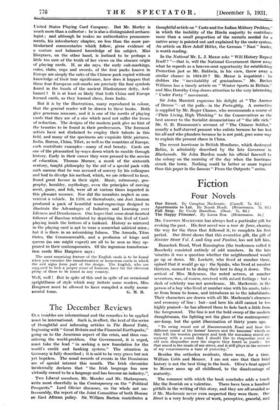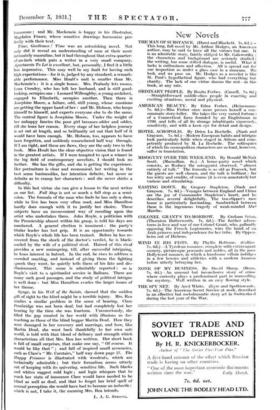Fiction
Four Novels
Ma. COMPTON Aiwa-Es-ma has always had a particular gift for evoking the past. His first novel was a tour de force, clearing the way for the three that followed it; to complete his first period. Our Street shows that this evocative gift, the gift of Sinister Street Vol. I. and Guy and Pauline, has not left him.
I3eauclerk Road, West Kensington (the tradesmen called it Booclerk) consisted entirely of odd numbers. In the late 'nineties it was a question whether the neighbourhood would go up or down. Mr. Lockett, who lived at number three, opined that it would go up : the Spinks, who lived at number thirteen, seemed to be doing their best to drag it down. The arrival of Miss Molyneux, the noted actress, at number seventeen, was, of course, received with mixed feelings : but a dash of celebrity was not unwelcome. Mr. Mackenzie, in the person of a boy who lived at number nine with his aunts, takes us from house to house, and introduces us to the inhabitants. Their characters are drawn with all Mr. Mackenzie's clearness and economy of line : but—and here his skill cannot be too highly praised—he has allowed them to fade back a little from the foreground. The line is not the bold sweep of the modern draughtsman, the lighting not the glare Of the contemporary arc-lamp, but the quiet illumination of thirty years ago.
" To swing round out of Hammersmith Road and hear the different sound of the horses' hooves and the hansoms' wheels as they left the wooden pavement and took the inseActsra stored my memory with a sound that I should like to rhapsodize over as old men rhapsodize over the singers they heard in youth : for that sound is the music of our street, and it still plays in the recesses of my consciousness a time of yesterday."
Besides the orthodox residents, there were, for a time, William Cobb and Mouser. I am not sure that their brief history is not the best thing in the book. Olive's final appeal to Mouser sums up all childhood, to the disadvantage of maturity.
The romance with which the book concludes adds a touch like the flourish on a valentine. There have been a hundred pitfalls in the writing of this story, and they are allavoided as if Mr. Mackenzie never even suspected they were there. Our Street is a very lovely piece of work, perceptive, graceful, and humorous ; and Mr. Mackenzie is happy in his illustrator, Magdalen Fraser, whose sensitive drawings harmonize per with their text.
Time, Gentlemen ! Time was an astonishing novel. Not only did it reveal an understanding of men at their most intimately masculine, but it had throughout that extra quarter- of-an-inch which puts a writer in -a very small company. Apartments To Let is excellent, but, personally, I find it a little less impressive. This may well be my _fault for having such high expectations—for it is, judged by any standard, a remark- able performance. Miss Hoult's unit is smaller than Mr. Mackenzie's : it is a single house. Mrs. Peabody lets rooms. Lena Crossley, who has left her husband, and is still good- looking, occupies one : Leonard Willoughby, a young architect, engaged to Elizabeth, occupies another. Then there is Josephine Moore, a failure, odd, still young, whose emotions are getting the upper hand of her : and Mr. Hobson, who keeps himself to himself, and expects everyone else to do the same. The central figure is Josephine Moore. Under the weight of her unhappy fancies the poor girl becomes odder and odder, till she loses her reason. Every stage of her helpless journey is set out at length, and so brilliantly set out that half of it would have been enough. Mr. Hobson, too, appears to have been forgotten, and suddenly remembered half way through. If I am right, and these are flaws, they are the only two in the book. Miss Hoult has the clear objective vision that is found in the greatest artists. If I were tempted to spot a winner in the big field of contemporary novelists, I should look no further. She has the gifts, and she is getting the experience. Her portraiture is clear and economical, her writing in the best sense businesslike, her intention definite, but never so definite as to cramp her characters : and she never shirks a difficulty.
In this last virtue she can give a lesson to the next writer on our list. Full Stop is not so much a full stop as a semi- colon. The formula of the man who finds he has only a short while to live has been very often used, and Miss Hamilton hardly does enough with it to justify her choice. These subjects have an inconvenient way of recoiling upon the artist who undertakes them. John Royle, a politician with the Premiership almost within his grasp, is told his days are numbered. A general election is imminent : the party's titular leader has lost grip. It is an opportunity towards which Royle's whole life has been trained. Before he has re- covered from the shock of the doctor's verdict, he is black- mailed by the wife of a political rival. Hatred of this rival provides a new mainspring, till, after successful intriguing, he loses interest in hatred. In the end, he rises to address a crowded meeting, and instead of giving them the fighting speech they want, he quietly tells them of his fate and dis- illusionment. This scene is admirably reported : so is Royle's visit to a spiritualist service in Bantam. There are many such good passages, and the study of political intrigue is well done : but Miss Hamilton evades the larger issues of her theme.
Synge, in his Well of the Saints, showed that the sudden gift of sight to the blind might be a terrible injury. Mrs. Rea studies a similar problem in the sense of hearing. Clare Pembridge was not born deaf, but had completely lost her hearing by the time she was fourteen. Unconsciously, she filled the gap created in her world with illusions as far- reaching as those of the blind beggar Martin Doul. How they were damaged in her recovery and marriage, and how, like Martin. Doul, she went back thankfully to her own safe world, is told with that blend of delicacy and strength which characterizes all that Mrs. Rea has written. Her short book is full of small surprises, that make one say, " Of course. It would be like that " ; and full of inspired small accuracies, such as Clare's " Mr. Carstairs," half way down page 57. The Happy Prisoner is illustrated with woodcuts, which are technically admirable ; but their formalism seems utterly out of keeping with its quivering, sensitive life. Such blacks and whites suggest cold logic ; and logic whispers that to reach her state of innocence Clare would have needed to be blind as well as deaf, and that to forget her brief spell of normal perception she would have had to become an imbecile : which is not, I take it, the meaning Mrs. Rea intends.
L. A. G. STRONG.











































 Previous page
Previous page